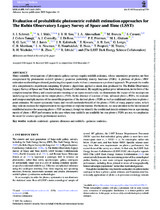| dc.contributor.author | Jarvis, M | |
| dc.contributor.author | Schmidt, S | |
| dc.contributor.author | Malz, A | |
| dc.date.accessioned | 2021-02-10T15:18:32Z | |
| dc.date.available | 2021-02-10T15:18:32Z | |
| dc.date.issued | 2020-09-14 | |
| dc.identifier.citation | Jarvis, M et al. 2020. Evaluation of probabilistic photometric redshift estimation approaches for The Rubin Observatory Legacy Survey of Space and Time (LSST).Monthly Notices of the Royal Astronomical Society.499(2):1587-1606 | en_US |
| dc.identifier.uri | http://doi.org/10.1093/mnras/staa2799 | |
| dc.identifier.uri | http://hdl.handle.net/10566/5894 | |
| dc.description.abstract | Many scientific investigations of photometric galaxy surveys require redshift estimates, whose uncertainty properties are best
encapsulated by photometric redshift (photo-z) posterior probability density functions (PDFs). A plethora of photo-z PDF
estimation methodologies abound, producing discrepant results with no consensus on a preferred approach. We present the results
of a comprehensive experiment comparing 12 photo-z algorithms applied to mock data produced for The Rubin Observatory
Legacy Survey of Space and Time Dark Energy Science Collaboration. By supplying perfect prior information, in the form of the
complete template library and a representative training set as inputs to each code, we demonstrate the impact of the assumptions
underlying each technique on the output photo-z PDFs. In the absence of a notion of true, unbiased photo-z PDFs, we evaluate
and interpret multiple metrics of the ensemble properties of the derived photo-z PDFs as well as traditional reductions to photo-z
point estimates. We report systematic biases and overall over/underbreadth of the photo-z PDFs of many popular codes, which
may indicate avenues for improvement in the algorithms or implementations. Furthermore, we raise attention to the limitations of
established metrics for assessing photo-z PDF accuracy; though we identify the conditional density estimate loss as a promising
metric of photo-z PDF performance in the case where true redshifts are available but true photo-z PDFs are not, we emphasize
the need for science-specific performance metrics. | en_US |
| dc.language.iso | en | en_US |
| dc.publisher | Oxford University Press | en_US |
| dc.subject | methods: statistical – galaxies | en_US |
| dc.subject | distances and redshifts | en_US |
| dc.subject | galaxies: statistics | en_US |
| dc.title | Evaluation of probabilistic photometric redshift estimation approaches for The Rubin Observatory Legacy Survey of Space and Time (LSST) | en_US |
| dc.type | Article | en_US |

